

Closed, main position. Chigorin defense: Karpov vs Unzicker 1974. Breyer defense: Fischer vs Spassky 1972. LoveThatJoker: <King Death> It's not about the last word here, it's about the facts regarding what you stated in your original post.
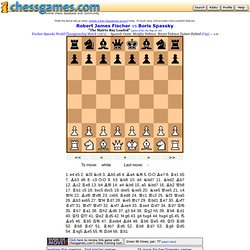
Once again, the exact quote from your original post is "he went 6-0 against the bottom of the table and split with everybody else. " Savon is a player who finished above the bottom six and also defeated Spassky in this tournament, hence there is no way there could have been a 'split' between them - as they only faced each other once in this tournament. Furthermore, aside from his loss against Savon and his victories over the bottom six, Spassky also netted a win against Taimanov. This means that Spassky was 'only even' with the other 9 players not 11. Conclusion: Flohr system: Kasparov vs Karpov 1986. GrahamClayton: Kasparov's cooments in "Umlimited Challenge": "Game sixteen, however, was one of my best in the match.
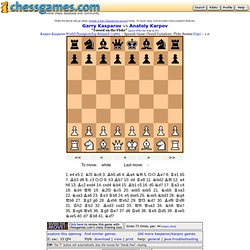
The clash of profound strategic plans, the sacrifices and counter-sacrifices, the mass of bewildering variations, all the quintessential features of a fight at the highest pitch of intensity which demands from the opponents all they have: this skirmish had it all. Keres defense: Kasparov vs Karpov 1990. GilesFarnaby: <Nimzonick: Karpov says in his memoirs that there was a trap associated with the variation up to move 21.
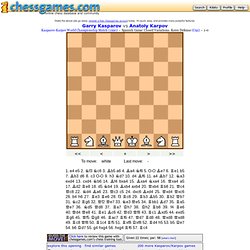
> I also wonder where can that trap be. Schussler analyzed this game and came out with a somewhat tricky response to the "natural" 21.Nb5 (Which for sure Karpov´s team had looked at): Marshall gambit: founding game. Marshall gambit: 11 ...c6 19 f3 Kramnik vs Aronian (2007) Berlin defense: Capablanca vs Reti (1914) Berlin defense: Alekhine vs Poindle (1936) Kriegspiel: <Tommy Jensen> Good question.
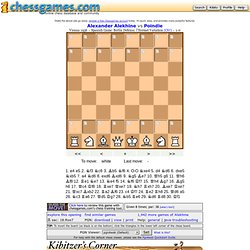
Chernev's book isn't conveniently accessible right now, so I don't know what he said (if anything) about the possibilities after 9...h6. I think the idea is to interfere with Black's development to give White time to organize an attack, though one is not immediately available. I note two things: (a) that after 9.Ng5 h6 Black's bishop remains blocking the d7 pawn; (b) the pawn on h6 presents a nice target. I would imagine 10.Ne4.
Berlin defense Kasparov vs Kramnik (2001) "Fall of the Wall" 7Heaven: I have read many articles and checked many informations regarding WW II and chess.
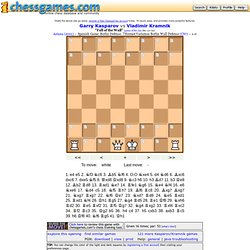
I read that Alekhine,along with Bogoljubow and other chess players avoided captivity-Alekhine even played some tournament organized by the nazis(he wasn't a friend of them of course). Alekhine first got his(greedy, as it has been proven) hands on the world title at 1927 while WW II started at 1939. That's almost 12 years. During that time,Alekhine 'carefully' picked his 'challengers'.
He underestimated Euwe, who showed him a thing or two- i really liked that. Avoiding the Berlin: Carlsen vs Grischuk (2013) Keypusher: <But Lasker reasoned that Capa, who needed only a draw would play timid and would not fully utilize his 2B compensation for his doubled pawn.

Lasker (if this theory is correct) reasoned that Spanish exchange needed vigorous handling from Black and that Capa was not mentally poised for such play, on that particular day. > Schliemann defense: Fischer vs Matulovic (1970)